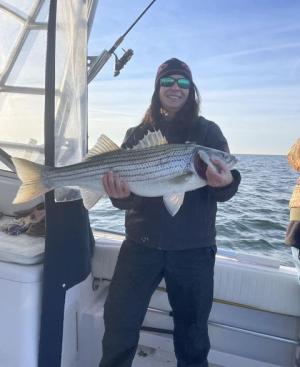The rockfish have arrived along the Delaware coast from the Eights south to Bethany Beach. From what I have been able to gather, trolling has been the top technique, and finding working birds is the best way to ensure some action.
Boats from Indian River and Lewes are working the area inside the three-mile limit. Some are running up to Cape May, while others are finding action right outside Indian River Inlet. Most are reporting a slow bite with only a few hits a day, unless they happen upon a school of rockfish feeding on bunker. Then the action is much better. Even when the SONAR is lit up with big marks, the fish are slow to bite.
I suspect the slow action is due to the cold water. Striped bass’s lower tolerance is around 50 degrees, and right now the water temperature in the ocean is 48 degrees at the Delaware Lightship.
If you have never fished for stripers in these conditions, I will tell you slow is the way to go. I have had good luck pulling Mann’s Stretch 25s and 30s or big MOJOs. I ran an Albemarle 24 as slow as it would go and watched my rod tips to make sure they were vibrating at the correct frequency. This is something you learn by experience. You watch those rods and you will know when they are working correctly. It is a nice steady vibration. Anything else and the plugs are not working correctly.
Sometimes I would pull MOJOs straight, while at other times I would put some action in them by holding the rod and using a sweeping motion. It doesn’t take long for that technique to get tiresome.
Always keep a lookout for diving gannets. They are not difficult to spot, as they dive from dizzying heights and crash into the sea.
All the reports I have seen show anglers with slot fish. Those are between 28 and 35 inches. So far, every report I have seen has been fish caught from boats. Nothing from the beach or from Indian River Inlet.
The current weather pattern doesn’t show any sudden cold snaps like we had over Christmas. This should maintain the water temperature, and keep the bunker and the rockfish here for a while. It is even possible they could come in range of us surf casters.
Roosevelt Inlet parking
It looks like the last free access to Lewes Beach and Roosevelt Inlet will be a thing of the past. While marking parking spaces at the inlet was a good idea to maintain some order to the parking, I feared it would lead to a parking fee, and it has.
The proposed fee would be $2.50 per hour between 9 a.m. and 5 p.m. during the season. That would affect beach users more than fishermen. We could still fish for free until 9 a.m. and come back at 5 p.m. and fish all night. If you are a serious angler during the summer, those are the best times to fish. Of course, at the inlet you also have to consider the tides. But even when the tide is not the best, dawn and dusk are still the optimum times to fish.
Hudson Canyon National Marine Sanctuary
The National Oceanic and Atmospheric Administration is in the process of considering designation of a new national marine sanctuary in the Hudson Canyon off the coast of New York and New Jersey. To this end, they will be forming an advisory council to guide the process of creating this marine sanctuary.
I am happy to see the makeup of this council includes two recreational fishermen, two commercial fishermen and two members from the marine industry. Tourism/recreation has one seat and citizens at large have two seats. Conservation has two seats and science/research has one seat. Education/outreach has two seats, and business and economic development have one seat.
Having followed what has happened in the Florida Keys and in California with marine sanctuaries, I am a bit gun-shy at the very mention of the idea. Both places have seen all access to their sanctuaries completely closed to the public. In the Keys, the areas are in shallow water, and the coral beds are being destroyed by human intrusion. California has the idea if you keep people out, the fish and other wildlife will prosper and repopulate the world.
At any rate, the makeup of this advisory council is a good start with people who have, I would hope, knowledge of the value of fishing in the Hudson Canyon and will not let the goofy greenies close it down.
If you feel you are qualified to serve on the advisory council, contact LeAnn.Hogan@noaa.gov for more information.























































